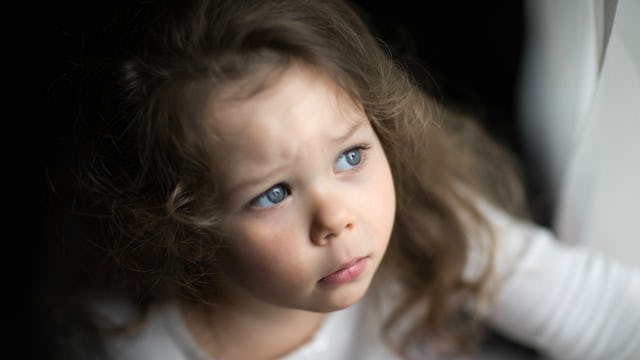My Child Has Autism, But I'm Scared To Tell You

My three-year-old daughter has autism. But, I’m scared to tell you that. You see, she has worked so hard to overcome her challenges and, I’m worried that, if you find out that she has autism, you will make things even harder for her.
She does not display the stereotypical characteristics of autism, so if I don’t tell you that she has autism, maybe you won’t know it. You might notice her speech is choppy and difficult to understand, but no one judges a child for a speech delay.
You see, I have learned my lesson in the past. Like the time I called ten different preschools whose available spots conveniently disappeared after I mentioned autism (even though I explained that my daughter did not require any accommodations and has no behavioral challenges). If educators, who are supposed to be both knowledgeable about and accepting of children, judge a three-year-old child based on a label, how will you judge her? Maybe, if I don’t tell you she has autism, you’ll treat her the same as you would any other child?
I do want to tell you that my daughter has autism though. I want to tell you because we moved here two years ago but have spent so much time juggling therapies that we haven’t had the time or energy to make friends. I want to tell you that the reason we can’t meet up is because she has therapy all the time. And, I want to tell you in order to change your misconception of autism. So, here it goes:
My three-year-old daughter has autism. She is also the best behaved child in her preschool class (thank you to the one school who welcomed her) and is super smart, sweet, and kind. She is a three-year-old who likes to play with other children, is social, and likes to share. She also loves to clean up. She is the smiley-est child that I know and does not have tantrums.
She also happens to be a three-year-old who got so overwhelmed at the Easter egg hunt that she wanted to be held rather than collect eggs. She is a three-year-old who gets so distressed by unanticipated schedule changes that she gets diarrhea and cannot sleep. She is a three-year-old who must have lunch before noon, must have a nap exactly at 1:30pm, and must have dinner before 5:30pm. She is a three-year-old who also has a rare speech disorder called childhood apraxia of speech.
But, if you see me around, I am still not going to tell you that she has autism.
You see, she is a three-year-old who has worked twenty hours per week in therapy in order to get to this point (pretty much every waking moment other than nap-time and two half-days per week in preschool). She is a three-year-old who had to work so hard to learn to do things that come naturally other people. She has learned how to point, share emotions, respond to her name, and how to talk.
She has learned how to tolerate finger paint on her hands, the sound of a hairdryer, and going to the beach. With the help of great instructors, she has both learned how to play and learned how to learn. She is a three-year-old who needs the socialization benefits of preschool (or a playdate) so much more than any other child. And, she is a three year old who deserves the opportunity to not be judged.
So, even though I want to, I am not going to tell you that my daughter has autism. After all, she is just a three-year-old child.
Note: This author has chosen to remain anonymous because she does not want her daughter to be stigmatized. She writes in an effort to change misconceptions about Autism and hopes to, one day, be able to speak freely without impacting her daughter’s future.